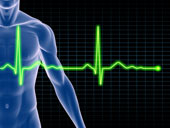ScienceDaily - 02-May-2014

Children who suffer cardiac arrest outside the hospital are more likely to survive with good brain function if emergency dispatchers give bystanders CPR instruction. CPR with chest compressions and breaths led to more favorable neurological outcomes in kids. Many causes may be responsible for a child's heartbeat and breathing to stop: choking, drowning, electrical shock, excessive bleeding, head trauma...
Medical News Today - 01-May-2014

Stem cell therapies work as a complement to standard treatments, potentially cutting the number of deaths after a year, suggests evidence from the latest Cochrane review: stem cell therapy for......
Medical News Today - 01-May-2014

Global health research and training efforts should focus on combatting the growing epidemic of noncommunicable diseases, better incorporating information technology into research and training, and......
Medical News Today - 01-May-2014

Imagine filling a hole in your heart by regrowing the tissue. While that possibility is still being explored in people, it is a reality in salamanders....
Medical News Today - 01-May-2014

A new study, recently published in the leading international peer reviewed journal, The Journal of Emergency Medicine, has shown how a simple, individualised 40- minute educational session......
ScienceDaily - 01-May-2014

Home visits by a cardiac surgery nurse practitioner (NP) following coronary artery bypass grafting (CABG) surgery can dramatically reduce a patient’s risk of hospital readmission and death 30 days after surgery, research shows. "The nurse practitioners are the key to this program's success because they provide patients they know from the hospital setting with robust continuity of care they need immediately...
ScienceDaily - 01-May-2014

Informed consent programs are somewhat beneficial for improving patient comprehension prior to cardiac revascularization, but many patients still have misconceptions about benefits and outcomes. “The primary finding of our study was that, contrary to expectations, even with the use of verbal scripted and multimedia consent mechanisms, patient understanding of the risks, benefits, and alternatives with...
ScienceDaily - 01-May-2014

Even today, significant variations – among surgeons and hospitals - still exist in the performance of mitral valve repair vs replacement for moderate to severe mitral regurgitation, shows a large-scale study. Significant associations were observed between the propensity for MV repair and both institutional and surgeon annual volume, although increasing surgeon volume appears to be the much stronger...
ScienceDaily - 01-May-2014

A type of cell that builds mouse hearts can renew itself, researchers report. They say the discovery, which likely applies to such cells in humans as well, may pave the way to using them to repair hearts damaged by disease -- or even grow new heart tissue for transplantation. "Eventually, we might even be able to deliver cells to damaged hearts to repair heart disease," one researchers says. ...
ScienceDaily - 01-May-2014

Heart cells created from human embryonic stem cells successfully restored damaged heart muscles in monkeys, researchers report. Stem-cell derived heart muscle cells infiltrated into damaged heart tissue, assembled muscle fibers and began to beat in synchrony with macaque heart cells. Scientists are working to reduce the risk of heart rhythm problems and to see if pumping action improves. ...
Medical News Today - 01-May-2014

A new review from The Cochrane Collaboration provides 'encouraging evidence' that stem cell therapy may be effective against heart disease....
Medical News Today - 01-May-2014

Scientists at Icahn School of Medicine at Mount Sinai, along with collaborators at institutions in India, Italy, and Japan, have identified the first gene linked to childhood-onset familial dilated......
Medical News Today - 01-May-2014

Increasing dietary fiber intake following a heart attack may reduce risk of death from all causes by 25% and death from cardiovascular causes by 13%, according to a new study....
Medical News Today - 01-May-2014

A drug known to reduce mortality rate in patients with heart failure has now been found significantly effective when administered early in patients following an acute (ST elevated) myocardial......
Medical News Today - 01-May-2014

New research looking at the success of clinical trials of stem cell therapy shows that trials appear to be more successful in studies where there are more discrepancies in the trial data....
Medical News Today - 01-May-2014

International study identifies first gene tied to childhood-onset familial dilated cardiomyopathy, and suggests several drugs already approved by FDA may be effective....
ScienceDaily - 01-May-2014

Would you be able to recognize the signs and symptoms of stroke? Do you know what to do if you suspect that you or a family member is having one? Signs of ischemic stroke include paralysis, particularly on one side of the body, difficulty with speech or vision, overall weakness and/or total loss of consciousness. Only about two out of three Americans can correctly identify at least one warning sign...
ScienceDaily - 01-May-2014

Obese individuals who have no signs of cardiovascular disease show a much higher prevalence of early plaque buildup in the arteries compared to healthy normal weight individuals, according to a study. The study challenges the idea of 'healthy' obesity, and researchers recommend all obese individuals be counseled about their risks for cardiovascular disease and receive tips for achieving a healthy weight....
ScienceDaily - 30-Apr-2014

A review of more than 25,000 admissions of Medicare beneficiaries to Rhode Island hospitals has found that patients with a documented diagnosis of dementia are nearly 20 percent more likely to be readmitted within 30 days than those without dementia. "Because dementia often goes undiagnosed, or is not documented in a patient's medical record, we believe that the current findings may underestimate readmission...
ScienceDaily - 30-Apr-2014

Imagine filling a hole in your heart by regrowing the tissue. While that possibility is still being explored in people, it is a reality in salamanders. A recent discovery that newt hearts can regenerate may pave the way to new therapies in people who need to have damaged tissue replaced with healthy tissue. Heart disease is the leading cause of deaths in the United States. ...














